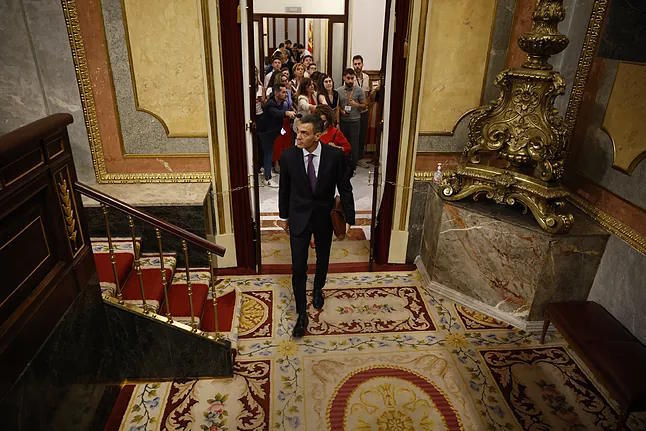"I will not throw in the towel." This is the premise with which Pedro Sánchez has started his appearance before the Plenary of the Congress. "I come to propose measures so that something like this does not happen again. Assuming responsibility is asking for forgiveness, taking measures, and moving forward to make Spain progress (...) I am a clean politician leading an exemplary party." With these words, the President of the Government has opened the debate on corruption in which he hopes, at least in words, to regain the confidence of the majority of the Chamber.
Sánchez has explained in general terms his relationship with Santos Cerdán and José Luis Ábalos, the two former Organization secretaries he chose. "That was my mistake," he said, referring to the trust he placed in them, especially in Cerdán, who is now in prison.
He admitted that he did not give credibility to the information that appeared in the media about the wrongdoings of his former number three in the party. "It is evident that I was wrong," he emphasized. Later, he recounted his shock at the information revealed in the report from the UCO. "It was a tough blow for me," he said before apologizing again to the citizens and acknowledging that the prevention mechanisms in his party, mainly regarding cases of sexism, did not work.
Sánchez also stated that he considered resigning from the Presidency but then thought better of it, deciding that it "was not an option" and chose to continue: "I will not throw in the towel," he emphasized. "I aspire to regain the trust of the parliamentary groups that supported my investiture, but I tell them that I will live up to it and fulfill the commitments I have with them." The third reason Sánchez cited for "not throwing in the towel" is to meet the aspirations of the partners.
From there, he outlined a country that is an "international benchmark" that, he said, is progressing in all areas despite there still being "many things to do," including "solving the problem of corruption" that exists but "does not affect the majority of politicians or companies." "There is no systemic corruption in Spain, but what exists is much less than in the past," he asserted before stating that his Government has done "many things" to combat and penalize it.
National plan to fight corruption
However, he stated, "more needs to be done." "As President, I will take on this task," he insisted. Thus, he proposed a national plan to fight corruption with 15 measures designed in collaboration with the OECD, the multilateral organization responsible for ensuring the democratic quality of its 38 member countries.
Risk prevention and strengthening controls are the first axis of the plan, which includes the establishment of an independent anti-corruption agency, as demanded by Sumar, the smaller partner of the Government. Additionally, the methodology applied to the allocation of Next Generation Funds will be extended to all State procurement processes by introducing Artificial Intelligence applications in the public sector contracting platform to detect fraud. There will be asset controls on senior officials, and parties and foundations will be urged to conduct regular audits.
The second axis will protect those who report corruption cases, to protect and support them. The third will strengthen the State's capacity to sanction corruption, including the creation of specialized sections in the lower courts and giving priority to cases involving public officials; there will be a reinforcement of the anti-corruption prosecutor's office, and the Criminal Procedure Law will be reformed to assign the instruction of these cases to the prosecutor's office. Additionally, penalties for crimes against the Public Administration will be toughened, and corrupt companies will be penalized based on annual revenues - not profits - and will also be affected by a ban on contracting with the administration. This last section was not detailed by the President.
The last axis of the plan is much more diffuse because it involves generating a "cultural change" regarding corruption, which will include opinion polls and public awareness campaigns. These processes, he said, "take time but their results are essential for building an integral society."
